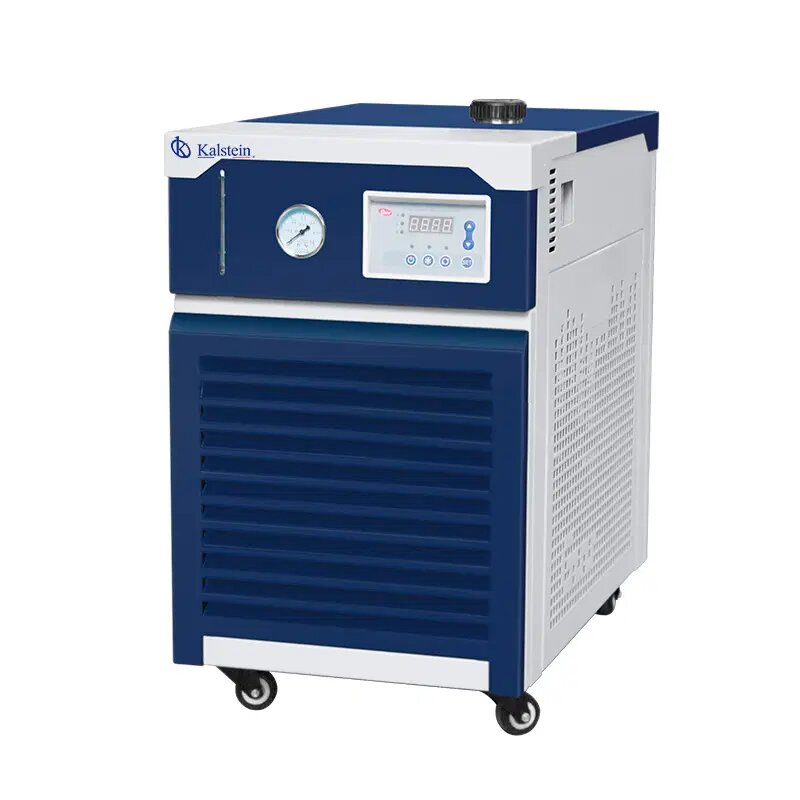Laboratory recirculating chillers are indispensable equipment in many fields of scientific and medical research. These devices allow for maintaining a constant and controlled temperature in various experimental processes, ensuring the precision and reproducibility of results. In this article, we will explore in detail the laboratory recirculating chiller, its advantages, applications, and a comparison among the main competitors in the market.
If you want to explore the high-end product catalog we have for you at KALSTEIN, visit us at https://kalstein.de/category-product/laboratory-line/recirculating-chiller/. We assure you that through our easy and feasible online PURCHASE channels, you will find the best prices on the MARKET. We remind you that at KALSTEIN, we MANUFACTURE high-level Laboratory Equipment for SALE. https://kalstein.de/
What is a Laboratory Recirculating Chiller?
A laboratory recirculating chiller is a device that uses a refrigerant to maintain the temperature of a closed system within a specific range. This device is essential in laboratories that require precise thermal control, such as in biological, chemical, and physical experiments. The ability to recirculate the refrigerant allows for continuous and uniform cooling, which is crucial for maintaining the stability of samples and reagents.
These chillers are versatile and can be used in various applications, from cooling analytical instruments to regulating temperature in chemical reactions. Moreover, their compact design and energy efficiency make them ideal for laboratories with limited space and resources.
Advantages of the Laboratory Recirculating Chiller
Precise Temperature Control
One of the main advantages of the laboratory recirculating chiller is its ability to provide precise temperature control. This level of precision is essential in experiments where even small variations can affect the results. High-quality chillers allow temperature adjustment with a precision of up to 0.1°C, ensuring the stability and reproducibility of experiments.
Energy Efficiency
Modern chillers are designed to be energy efficient, which not only reduces operational costs but is also beneficial for the environment. These devices use high-efficiency compressors and advanced refrigeration systems that minimize energy consumption without compromising performance. This is especially important in laboratories operating on tight budgets and seeking to reduce their carbon footprint.
Applications of the Laboratory Recirculating Chiller
Cooling of Analytical Equipment
Recirculating chillers are commonly used to maintain the temperature of analytical equipment, such as spectrometers, chromatographs, and microscopes. These instruments generate heat during operation, and proper temperature control is essential for their correct functioning and the accuracy of their measurements. The chiller ensures that these instruments operate within their optimal temperature ranges, prolonging their lifespan and enhancing their performance.
Temperature Control in Chemical Reactions
In chemistry, temperature control is critical for many reactions. Recirculating chillers allow for maintaining ideal conditions for both endothermic and exothermic reactions, ensuring they proceed in a controlled and safe manner. This is particularly important in complex chemical syntheses and in the production of temperature-sensitive compounds.
Comparison of Laboratory Recirculating Chillers
Below is a comparative table of laboratory recirculating chillers from the main competitors in the market:
|
Feature |
Kalstein |
Wiener Lab |
Labware |
Sartorius |
|
Temperature Precision |
±0.1°C |
±0.2°C |
±0.1°C |
±0.1°C |
|
Temperature Range |
-20°C to 100°C |
-10°C to 80°C |
-20°C to 100°C |
-25°C to 90°C |
|
Cooling Capacity |
500W |
400W |
450W |
600W |
|
Energy Efficiency |
High |
Medium |
High |
High |
|
Ease of Use |
Touchscreen, intuitive interface |
Analog controls |
Digital screen, simple controls |
Touchscreen, advanced interface |
|
Size and Weight |
Compact and light |
Medium |
Compact |
Large and robust |
|
Price |
Competitive |
Medium |
High |
High |
Pros and Cons of the Laboratory Recirculating Chiller
Advantages
-
Temperature Precision: Provides extremely precise temperature control, essential for sensitive experiments.
-
Energy Efficiency: Its efficient design reduces operational costs and environmental impact.
-
Versatility: Can be used in a wide variety of applications, from cooling equipment to controlling chemical reactions.
-
Ease of Use: Intuitive and easy-to-use interface, facilitating operation even for non-specialized users.
Disadvantages
-
Initial Cost: The initial investment can be high, although it is offset by long-term savings in energy efficiency.
-
Maintenance: Requires regular maintenance to ensure optimal functioning and prolong its lifespan.
Frequently Asked Questions about the Laboratory Recirculating Chiller
Is it difficult to install a laboratory recirculating chiller?
No, most laboratory recirculating chillers are designed to be easy to install. Installation generally involves connecting the device to the power source and the equipment that needs cooling. Additionally, they come with detailed user manuals and, in many cases, technical support from the manufacturer to assist with installation and configuration.
What type of maintenance does a laboratory recirculating chiller require?
The maintenance of a laboratory recirculating chiller is relatively straightforward but essential for optimal performance. It includes regular cleaning of air and water filters, checking and recharging the refrigerant, and periodic inspection of connections and components to ensure there are no leaks or wear. Following a maintenance schedule recommended by the manufacturer can significantly extend the equipment’s lifespan and maintain its efficiency.
The laboratory recirculating chiller is an essential tool in any modern laboratory requiring precise temperature control. Its versatility, energy efficiency, and ease of use make it an ideal choice for a wide range of scientific applications. When considering the acquisition of a recirculating chiller, it is important to evaluate the features and advantages of different models available on the market, as well as their technical specifications and the support offered by manufacturers. With this information, you can make an informed decision that will benefit your research and experiments in the long term.

